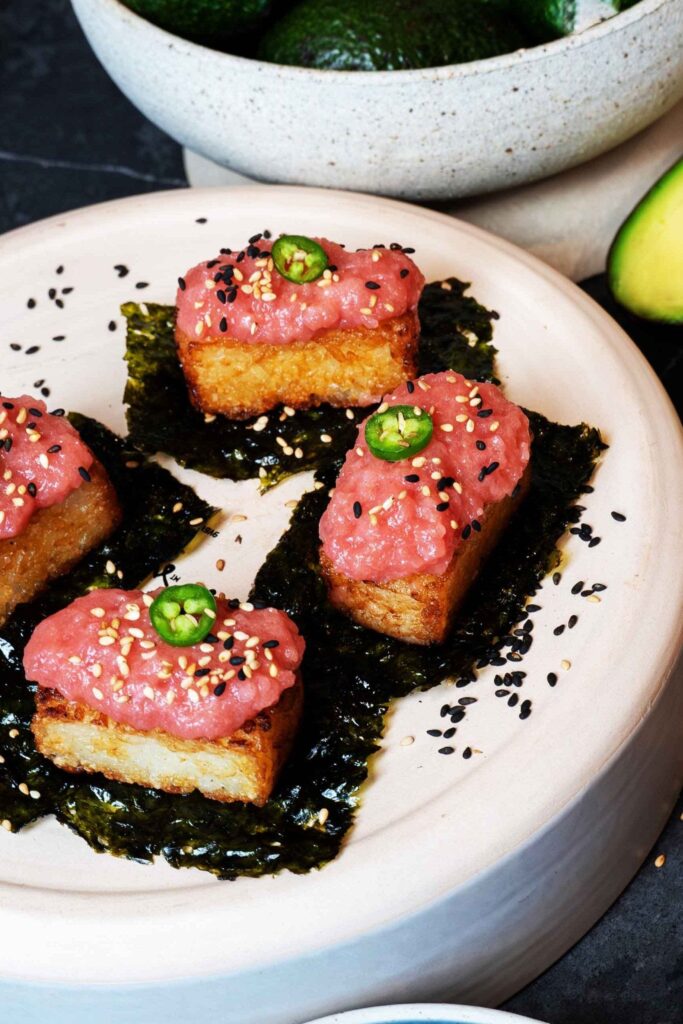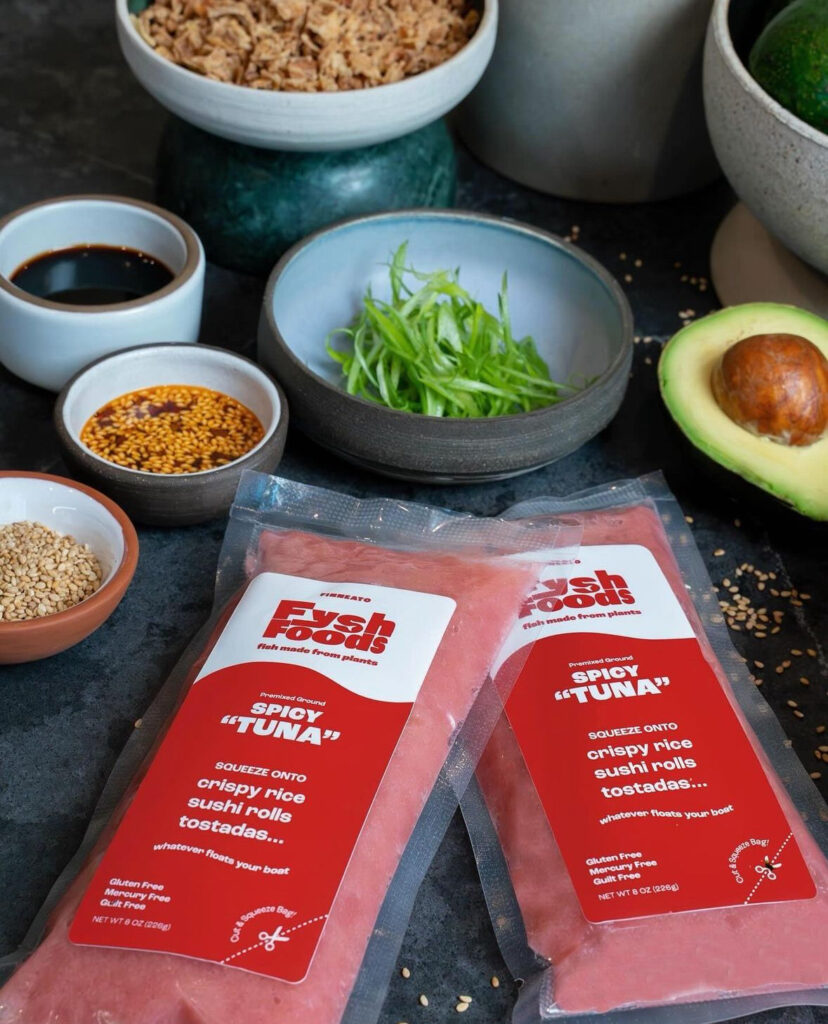5 Mins Read
Los Angeles-based food influencers Zoya Biglary and Alix Traeger landed a Shark Tank deal with Daniel Lubetzky for their vegan seafood startup Finneato Fysh Foods.
Amid the rough waters for plant-based seafood, an up-and-coming brand has just earned the ultimate TV stamp.
Zoya Biglary and Alix Traeger, an influencer couple from Los Angeles, won a deal on ABC’s Shark Tank with Daniel Lubetzky, who invested $150,000 for a 30% stake in their business, Finneato Fysh Foods.
The company is aiming to disrupt the traditional seafood category with a clear message about its health detriments, thanks to the presence of mercury, microplastics and other harmful substances that end up in the human body.
Why Finneato Fysh Foods is tackling raw fish

Finneato Fysh Foods was founded in 2021 by Biglary, a private chef who said she was the “very first gay Persian woman” to ever appear on Shark Tank. Traeger, meanwhile, is a Buzzfeed alum and wrote for its food-focused Tasty brand during its formative years.
Seeking $150,000 from the Sharks for a 10% stake, Biglary and Traeger painted a tongue-in-cheek picture of a very real problem: imagine if your sushi restaurant serves you a plate of parasites, mercury and microplastics. It might sound crazy, but it is the sad truth about a “lot of raw fish that we consume”, Biglary noted.
It’s true – seafood eaters consume up to 11,000 microplastic particles per year, which can lead to long-term health risks. At the same time, these foods often come in styrofoam plastic packaging, which has harmful effects on marine and human health. Biglary isn’t vegan, but it’s these issues that prompted her to move away from raw fish and establish a plant-based brand.
The lure for the Sharks, the two entrepreneurs hoped, was that this was a vegan food company “made in the kitchen by chefs, and not in a lab by mad scientists”.
Finneato Fysh Foods’s vegan seafood is made from a blend of root vegetables like tapioca, beetroot and konjac root, alongside pea protein, kappa carrageenan (which is derived from algae), and flaxseed oil. The startup employs age-old fermentation techniques to elevate the flavour of its range, which includes tuna, salmon and yellowtail.
It also boasts 4g of protein and 3g of fibre per serving, zero saturated fat, and micronutrients like iron, potassium, omega-3 fatty acids, and vitamins A and B12.
“Because it cuts and handles just like real fish, it’s easily adaptable for chefs to use in our favourite dishes, like sushi, ceviche, poke, salmon and lox,” said Biglary, “except that our fish is way cheaper and lasts way longer than the real thing.”
Negotiation skills impress Daniel Lubetzky

After hearing the pitch, the Sharks were presented with samples in the form of spicy tuna crispy rice, smoked lox, and ceviche. They were immediately impressed with the flavour and texture of the products, with particular praise for the ceviche.
However, the pitch hit a snag when it came to the financials. Biglary revealed that the business had sold $50,000 worth of its seafood in wholesale deals with restaurants in Los Angeles since last year, at a price of $10-13 (the cost to produce is $4 per pound) – much lower than conventional sashimi fish.
But the Sharks seemed concerned with their B2B model, since Biglary and Traeger have three million followers on social media between them. Kevin O’Leary and Robert Herjavec dropped out quickly, followed by Lori Greiner and Mark Cuban, who said it was too early and too hard to scale, respectively.
That left Lubetzky, the man behind the Kind snacks empire. Before his negotiation, the entrepreneurs were asked why they didn’t go the traditional venture capital (VC) route, as other brands in the space have. Biglary pointed out that women-funded startups receive only 2% of all VC money: “That number reduces to 1% if you’re a woman of colour, and that number reduces again if you’re a gay woman of colour.”
Lubetzky again praised the product and acknowledged it addressed a major problem with the seafood industry, but stressed that the frozen foods space is difficult and it would take a lot of time and work for Finneato Fysh Foods to succeed. He first offered the $150,000 they asked for, but for 40% of the company.
Biglary countered with 20%, explaining that a 40% stake would impede the company’s growth plans. After some conflicting advice from O’Leary and Cuban, Lubetzky brought his ask down to 35%. Biglary again said she couldn’t “shoot [herself] in the foot”, and countered with 25%. Her words were effective, with Lubetzky going down to 30%, valuing the company at $500,000. After some deliberation with Traeger, Biglary took the deal.
“It was clear to me that this duo has the tenacity and passion to keep pushing forward towards their dreams. Did you see that negotiation?!” Lubetzky wrote on Instagram after the episode aired, hailing Biglary and Traeger’s “creativity, confidence, and grit”.
His investment has helped the couple scale their business, and they heeded the Sharks’ advice of targeting the D2C channel with a squeezable vegan spicy tuna now, available on the brand’s website.
Vegan seafood still makes up just 1% of the overall seafood and plant-based industries, and financial difficulties have prompted several startups to shut down over the last year. But Finneato Fysh Foods will hope to capitalise on the Shark Tank effect and Biglary and Traeger’s large social media presence to ride the wave.



